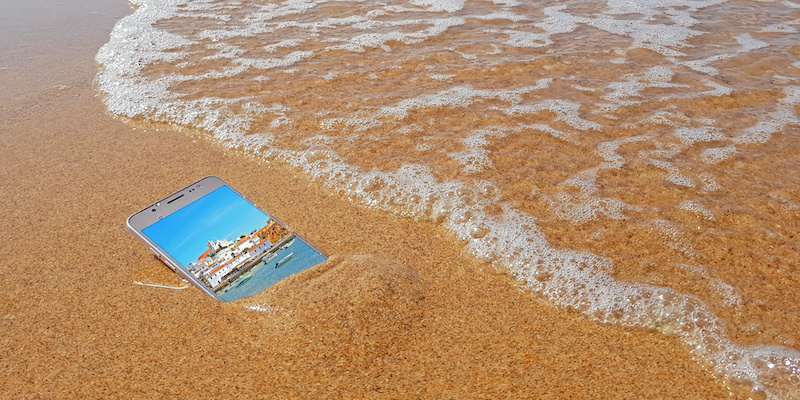This is the true story of how my husband shattered his phone on vacation, only to have another suddenly wash up on the beach at his feet—the first in a string of unlikely, eerie events, and the inspiration point for my new thriller, The Only Survivors.
It began on the first day of a family trip.
We were visiting my husband’s family in Puerto Rico, and we had brought our friends with us to explore the area.
The first sign that things weren’t going to go quite as planned was when we went to pick up our rental vehicle, only to discover there was only one van left on site—a mid-size tour vehicle. Closer to a small bus than a minivan.
We clambered inside, deciding this would be fun adventure for the rest of us, though probably a little stressful for the driver (my husband), as we planned to navigate down some narrow, winding roads during the week.
Even before we started driving, things took a turn. Sign two, for those keeping track.
As my husband entered the car, he placed his phone, map program pulled up, in the cupholder beside the door, not noticing the very small print warning: No phones here!
Too late. He pulled the door shut, and the sound that followed can best be described as the noise one makes when violently crunching a water bottle with both hands.
“What was that?” I asked, thinking, I really, really hope that was a water bottle.
No such luck. It was his phone, which had just been crushed against the van door. The screen was shattered, the phone unusable. It’s safe to say that Day One was off to a fairly ominous start.
And then things got weird.
The next morning, my family was taking a walk on the beach, when they spotted something churned up in the surf. My husband lunged to grab it before it washed back into the sea. Imagine his surprise: It was a phone. The protective case was cracked, and the device was sand-coated and water-logged. Unsurprisingly, the phone was dead.
Still, they brought it back to our condo and left it on the edge of our balcony in the sun, in the hopes that it might be salvaged. It felt like a sign. Like something they were meant to find, especially after destroying a phone the day before. We went about our day, and, to be honest, by the late afternoon I had mostly forgotten about the phone, assuming it was well past the point of saving anyway.
My teenage daughter returned to the condo first. When we met her there, she casually informed us that she had brought the phone inside and connected it to a charger. “It works,” she said. More than that: There was no password screen. Everyone seemed excited by this turn of events, now intent on tracking down the phone’s owner. But all I could see was a big red flag. Were there people who didn’t enable a lock screen? Or was this a sign of something much more ominous?
The thriller writer in me quickly became convinced that this phone was surely evidence of a crime, and now we had just made one serious mistake: We had turned it on, thus enabling whoever was responsible to track it down—straight to us.
When I voiced my concern, my family looked at me like I was out of my mind. Turns out, imagining the worst case scenario might be a useful skill when writing thrillers, but maybe not the best skill for existing in daily life.
Undeterred, they continued in their quest to find the phone’s owner, though they ran into a few hurdles: First, it seemed that opening any app would suddenly trigger the phone to restart; and second, the phone only worked (I use the term loosely) when plugged into a charger.
Finally, they were able to access a clue: The most recent photo on the camera. It appeared to be taken from the vantage point of someone on a jetski, looking out at the ocean.
This photo only seemed to bolster my claim—only now we had also seen evidence of the scene of a crime. Again, my concerns were ignored.
They were also able to view the call log, though they couldn’t send any texts or make any calls without the phone rebooting itself. However, they were able to write down the number from the most recent call, with the intent of reaching out directly from one of our own phones.
Another mistake, I thought, though at this point I was truly and fully outnumbered. I knew there would be no going back. If this was a piece of evidence in a crime, we were now going all in.
Thankfully, this turned out not to be the case. They sent a text to the number, reached a family member of the phone’s original owner, and explained that we had found their phone on the beach in Puerto Rico. They were also shocked. The phone had been lost two weeks earlier on vacation. While on a jetski. And yes, they would be very grateful to have it returned to them, as the phone hadn’t been backed up.
We agreed to do so. When we returned home, we mailed the phone back to the owner, but I couldn’t shake the thoughts: How had this phone survived two weeks in the sea? How had it ended up washing right back up on our beach? Who doesn’t have a password screen?
The mysteries kept growing, and so, too, did another story—one that was suddenly taking shape in my head. For weeks, my imagination followed the what-ifs. Until ultimately, I knew I had to write it. I started thinking about who might be at the center of a story like this, and how the layers could be interconnected between the people who both lost and found the phone.
And so a different, alternate version of events was born. The group on the beach were neither family, nor friends. They were the only survivors of a tragic accident in their past. And they’ve been coming together every year on the anniversary, to keep one another safe. Or so they claim…
Near the start of the book, there’s a scene that looks eerily similar to the one I just described. Cassidy, the narrator, is walking on the beach, only to have a strange phone wash up at her feet. Later, she’s able to bring it back to life, though it keeps restarting. It only works when it’s plugged into a charger, and, improbably, it has no passcode screen.
That is where the similarities end. From there, the story takes a very, very different turn. At its heart, it’s the story of how a group of people who experience the same life-changing event can be impacted in completely different ways. It’s the mystery of both what happened in the past, and what’s now happening to them in the present, as the number of the surviving members continues to fall. The phone is a smaller plot-point in a much bigger overarching storyline. But this, for me, was the beginning of everything.
The group at the center of The Only Survivors came to life because of this: the mystery of a phone on the beach. The quest to track down its owner and return a lost item. A happy ending in real life. Not suspicious at all… Or so everyone keeps assuring me.
***


















